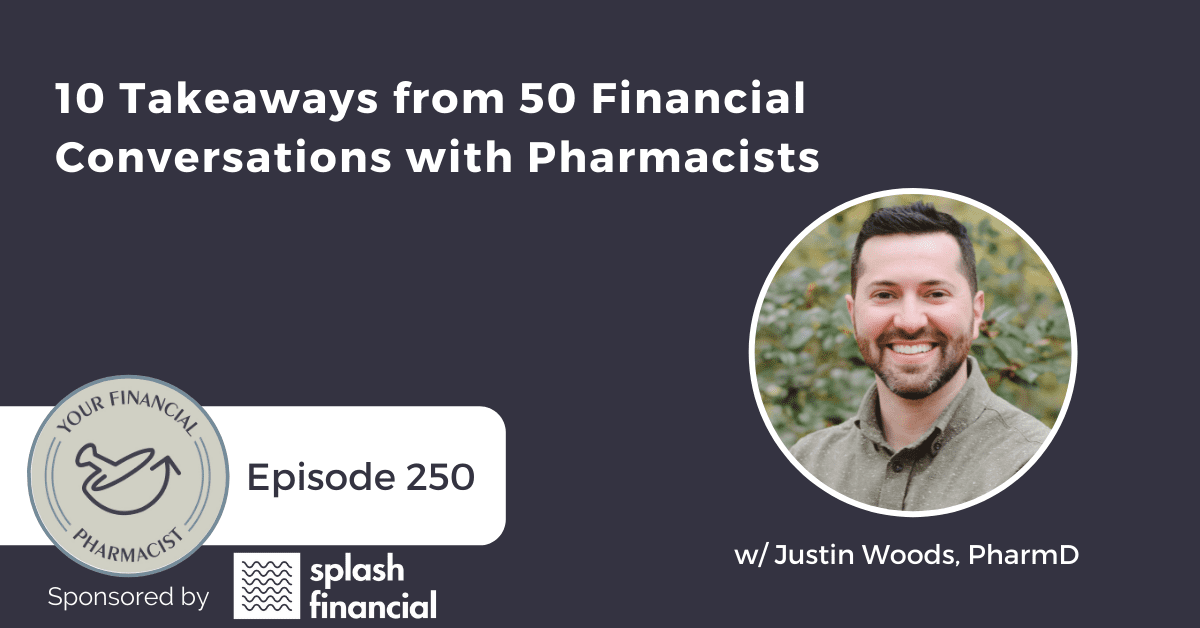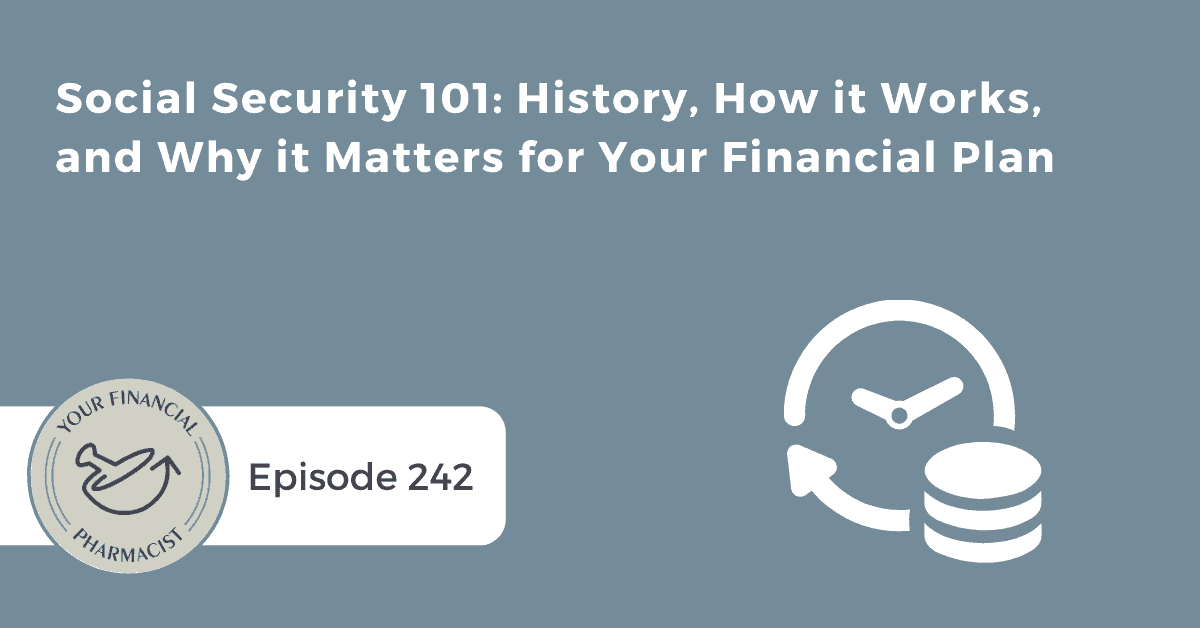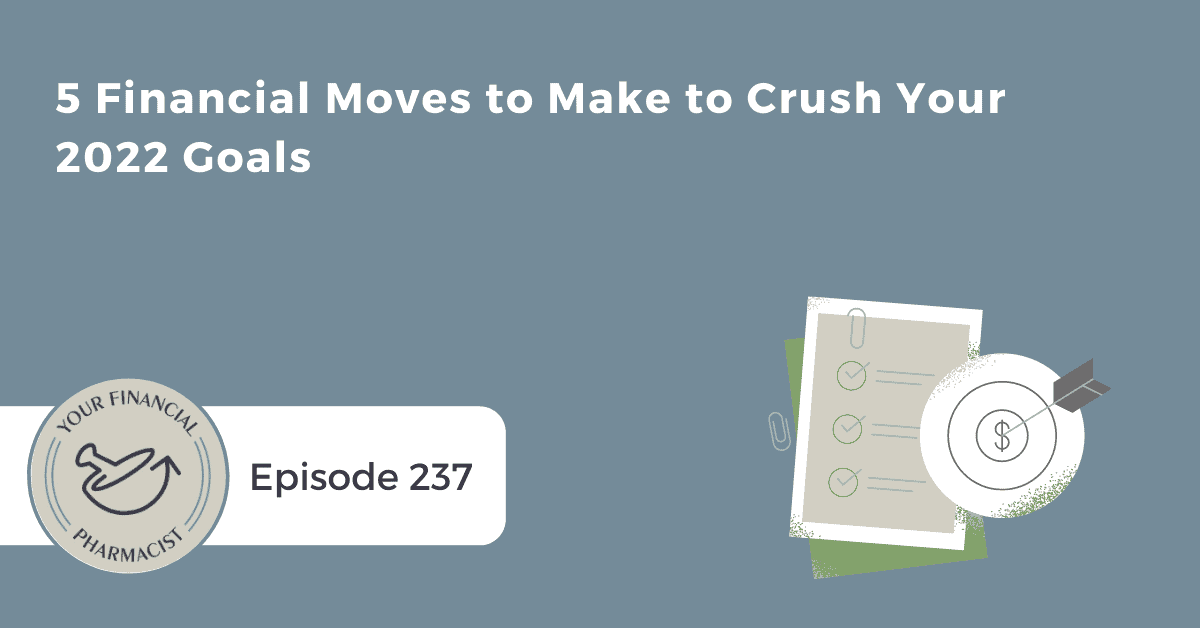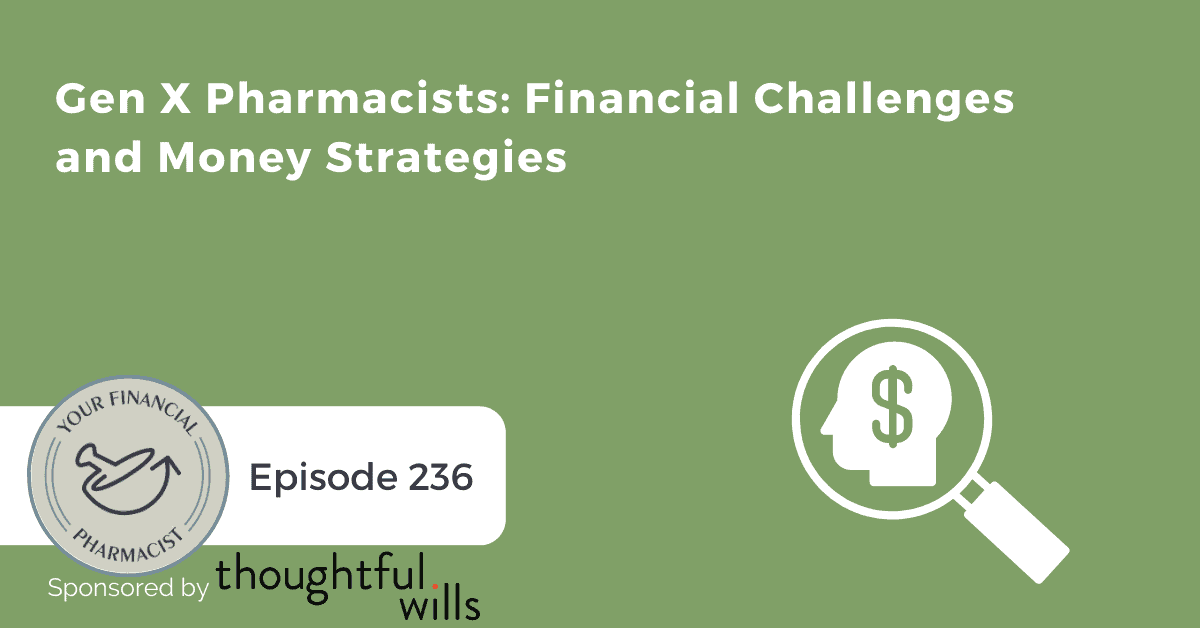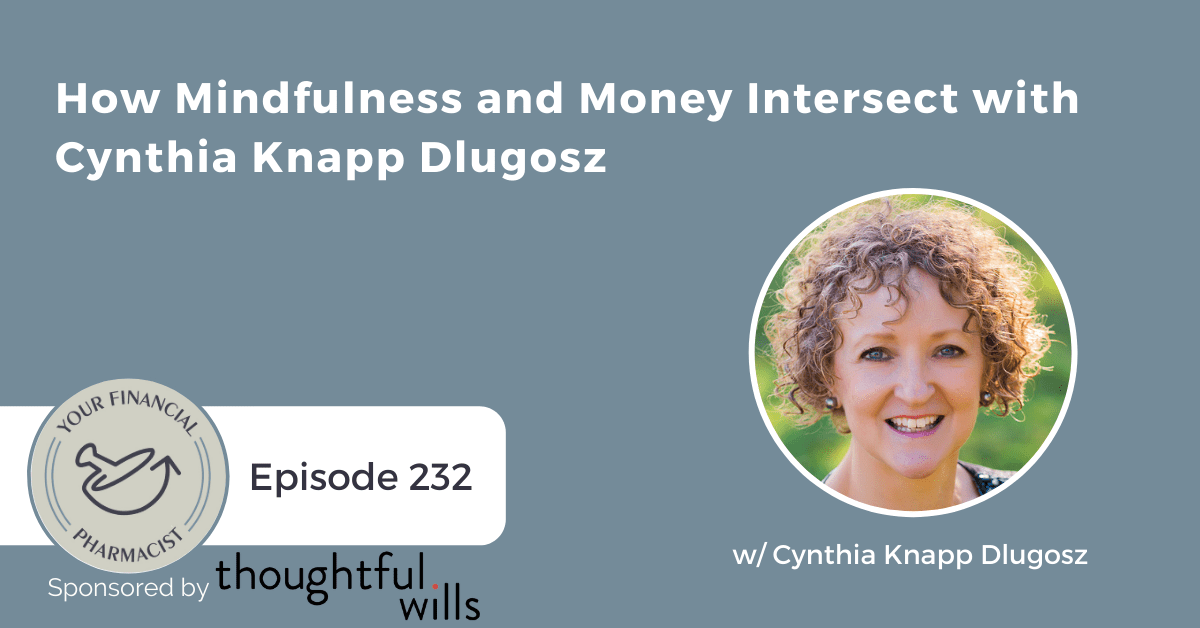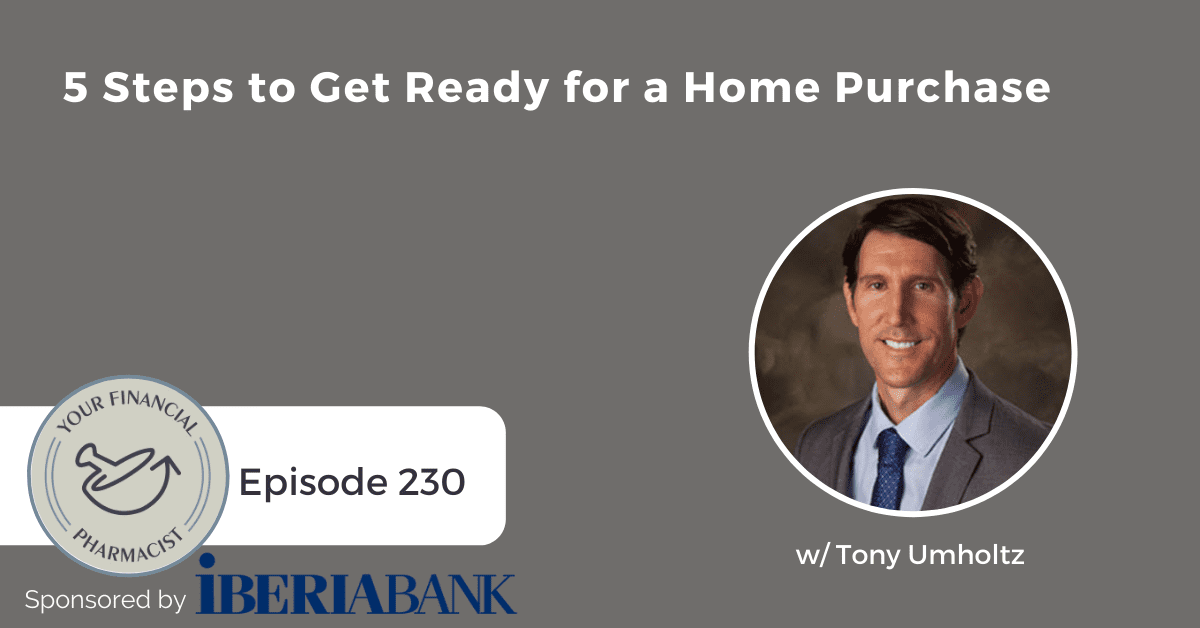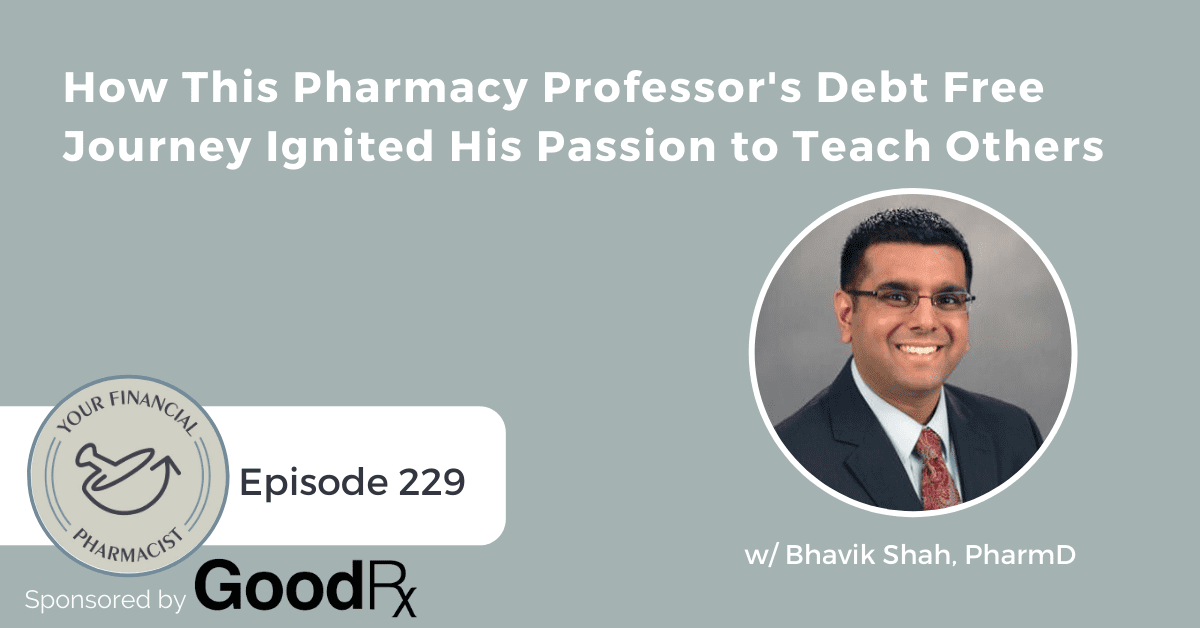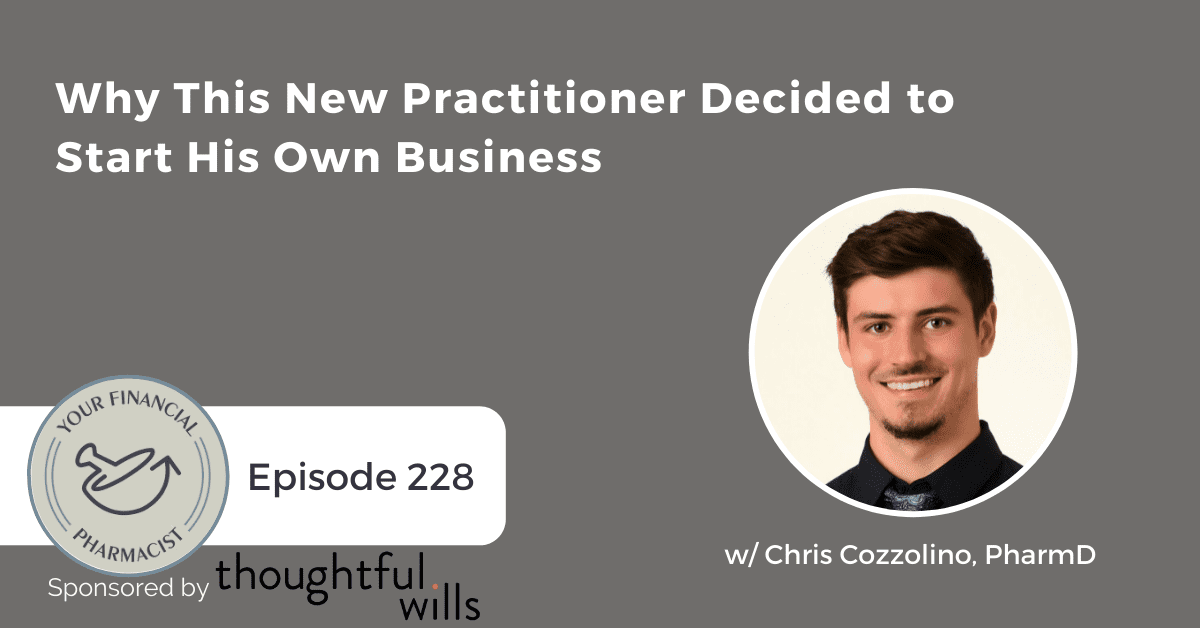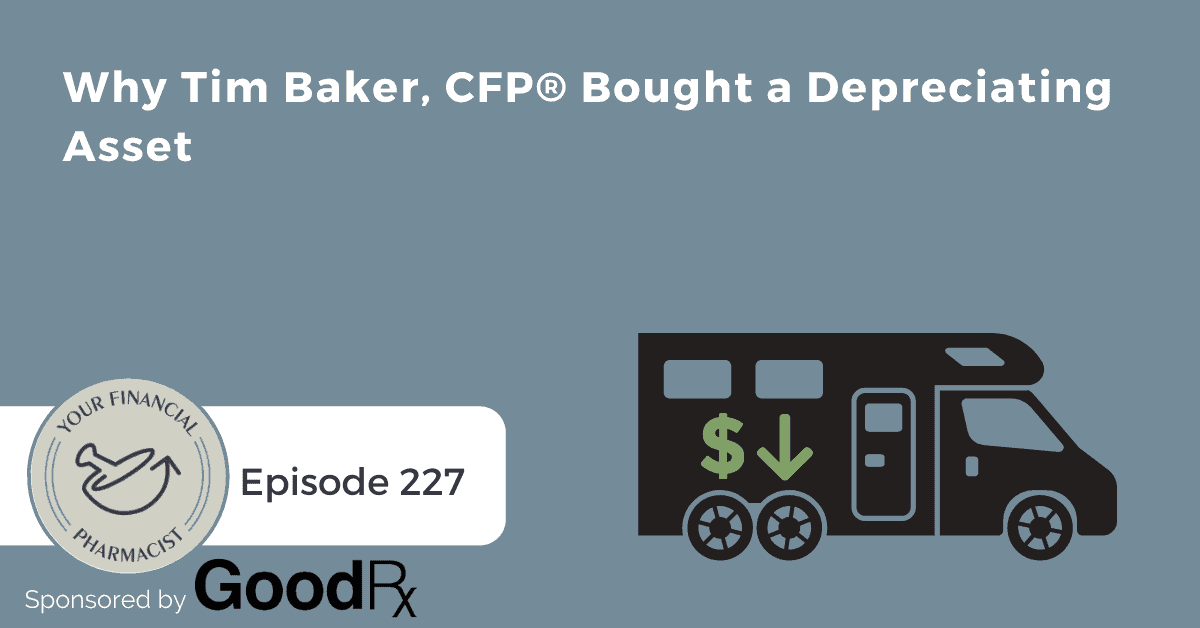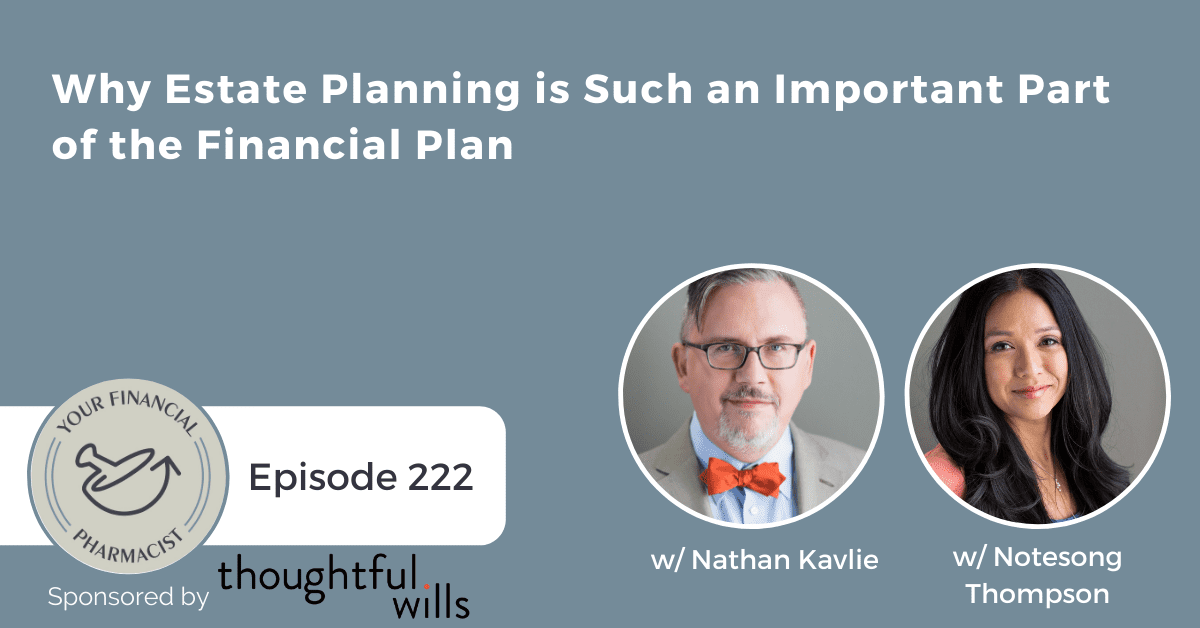10 Takeaways from 50 Financial Conversations with Pharmacists
On today’s episode, sponsored by Splash Financial, YFP Director of Business Development, Justin Woods, PharmD talks about 10 takeaways from more than 50 discovery calls he’s conducted, where he has had a close look at the financial goals and concerns of pharmacists across the country.
About Today’s Guest
Justin Woods, PharmD received his Doctor of Pharmacy degree from Albany College of Pharmacy and Health Sciences, completed two years of postgraduate residency training at The Ohio State University College of Pharmacy, and is currently in his final semester at the University of Nebraska at Omaha pursuing a Masters in Business Administration degree.
Justin has spent nearly 10 years as a practicing pharmacist in community and specialty pharmacy settings. Originally from Upstate New York, Justin met his wife, Sara, also a pharmacist, during residency in Columbus, OH. They lived in Omaha, NE for four years and currently reside in Richmond, VA.
Justin is looking forward to connecting with our community and communicating the value of YFP to help pharmacists on a similar path as himself toward achieving financial freedom.
Episode Summary
Knowing the steps to reach your financial goals can be overwhelming and confusing, particularly at the start. YFP Co-Founder & CEO, Tim Ulbrich, PharmD, sits down with Justin Woods, PharmD, a fellow pharmacist and YFP Director of Business Development. Currently, Justin leads the discovery call process designed to help individuals determine whether or not the comprehensive financial planning services at YFP Planning comprehensive are a good fit for them. Since joining the YFP team in November 2021, Justin has conducted more than 50 of these discovery calls. Justin talks about ten takeaways he has had from these conversations. Justin shares his unique experience working at YFP and how he has gone from a fan of the podcast to the Director of Business Development. Justin explains how his prior experience as a YFP Planning client helps him conduct discovery calls, the benefits of discovery calls, what makes the YFP approach to financial planning different, and the best time to start your financial planning journey. Finally, Justin details why financial planning requires a substantial investment of time and money, why the transparency of the fees involved is so important, and addresses the most common question he hears, “What’s the return on investment?”
Key Points From This Episode
- What YFP Planning has to offer clients and what discovery calls are.
- Why people feel guilty about their financial situation when seeking advice.
- The concerns clients have regarding saving up for retirement.
- The prevalence of questions and interest that Justin experiences regarding real estate.
- A brief outline of the concerns around repayment of student debt and the PSLF program.
- Why YFP Planning services are suited for non-pharmacists as well.
- The importance of involving both partners in the planning process.
- When is the best time to begin the financial planning process.
- Justin outlines some of the fees associated with the planning process.
- An explanation of the “fee-only” model that YFP Planning uses.
- Challenges around estimating the return on investment for clients.
- The benefits of coupling your financial plan with a tax plan.
Highlights
“Generally speaking, if you have the motivation to book a discovery call, to find time in your busy schedule to prioritize your financial wellness, you’re making a big step and that should be acknowledged.” — Justin Woods, PharmD [0:11:24]
“In most models of financial planning, the more that you put money into an IRA, brokerage accounts, the more the advisor gets paid.” — Justin Woods, PharmD [0:16:34]
“We’re called Your Financial Pharmacist, but our planning services are technically for people of all income levels, all career backgrounds.” — Justin Woods, PharmD [0:21:47]
“Over time, investments are a tool to actually combat inflation and, with proper allocation, keeping expenses in your investment accounts low, your investments will grow with the market.” — Justin Woods, PharmD [0:30:13]
Links Mentioned in Today’s Episode
- YFP Planning: Financial Planning for Pharmacists
- Schedule a free Discovery Call with YFP Planning
- Refinance Your Student Loans with Splash Financial
- SPIVA Data
- YFP 247: 10 Common Financial Mistakes Pharmacists Make
- YFP Real Estate Investing Podcast
- YFP Real Estate Investing 01: Intersection Between Financial Planning and Real Estate
- YFP 248: How 3 Pharmacists Had $700,000 of Student Loans Forgiven
- YFP Tax
- Your Financial Pharmacist Disclaimer and Disclosures
Episode Transcript
[INTRODUCTION]
[0:00:00.4] TU: Hey, everybody. Tim Ulbrich here, and thank you for listening to The YFP Podcast where, each week, we strive to inspire and encourage you on your path towards achieving financial freedom.
This week, I had a chance to welcome fellow pharmacist and YFP director of business development, Justin Woods on to the show. Justin leads our discovery call process designed to help individuals determine whether or not YFP Planning and its comprehensive financial planning services are a good fit for them. Since joining the YFP team in November 2021, Justin has conducted more than 50 of this discovery calls.
And on today’s show, we talk about 10 takeaways he has had from these conversations where he’s had a close look at the financial goals and concerns of pharmacists across the country. Some of my favorite moments from the show include hearing Justin talk about the various guilt individuals have when reaching out to a financial planner, whether that be about a previous mistake, join the club, feeling like they could be doing more or even as you’ll hear Justin say, having too much cash on hand.
Also, hearing Justin talk about determining when the timing is right to work with a planner and why there is a cost to not starting with the financial planner. Why planning requires a substantial investment of time and money and why the transparency of the fees involved is so important and how he answers the most common questions he gets, which is, “What’s the return on investment of the planning services?” Okay, let’s hear from today’s sponsor and then jump into my interview with Justin.
This episode of Your Financial Pharmacist Podcast is sponsored by Splash Financial. With interest rates on the rise, it’s a good time to evaluate the refinancing of your student loans. If you’ve ever considered refinancing your loans, check your rate now through Splash Financial.
Refinancing could help you get a lower monthly payment on your student loans or get a lower interest rate. Splash helps you shop and compare loan refinancing offers across lenders nationwide. Browsing rates through Splash Financial is fast, free and won’t impact your credit and now, when you successfully refinanced $50,000 or more, Splash Financial will give you an extra $500 in cash bonus, using our link at splashfinancial.com/yfp. Check your rate today and see what you might be able to save at splashfinancial.com/yfp.
[INTERVIEW]
[0:02:16.8] TU: Justin, welcome to the show.
[0:02:18.4] JW: Hey, Tim. Pleasure to join you. A bit surreal, actually, since I’ve been a long-time listener of the podcast since 2017 now, and now feature as a guest in addition to being part of the YFP team.
[0:02:29.0] TU: We are so glad, Justin, to have you as a part of the team. You and I have known each other for sometime on the pharmacy world, we completed residencies a few years apart of your house at University College of Pharmacy, had some great shared mentors there and are really excited to have you as a part of the YFP team.
[0:02:45.2] JW: Definitely. One quick point before we get started, I don’t want our listeners to think this podcast is having an issue buffering when I’m speaking. I do have a stutter or as I like to say, I speak with a remix. That is my one disclaimer for folks who might not know me since I’m human and you may hear a stutter periodically throughout this episode.
[0:03:06.1] TU: Appreciate that, Justin. So, here we are, episode 250, we just crossed a million downloads. Thank you so much to the YFP community, the support that you’ve provided us since launching the podcast in July of 2017. Really, a surreal moment for us and for folks that had been listening for a while, if you haven’t yet done so, if you could please do us a favor and leave us a rating and review on Apple Podcast, wherever you’re listening to the show, we’d really appreciate that and be a great way to help others find the show as well. Thank you so much for the ongoing support that everyone has provided.
Today, we’re going to be talking, Justin and I, about 10 takeaways that he has had in 50 plus conversations with pharmacist about t heir financial goals, about their financial plan, since he joined the YFP team in mid-November of 2021. These conversations come through the discovery call that we offer folks and Justin leads these efforts, these discovery calls are an opportunity to learn more about YFP Planning and comprehensive planning services and folks can learn more at yfpplanning.com.
Justin, before we jump into your story, before we talk more about the takeaways that you have had through these 50 plus conversations, give our listeners who may not be familiar with the planning services offered by YFP Planning, more insights into what the discovery call is, why it’s important and what they could expect?
[0:04:31.5] JW: To be honest, hiring a financial planner, it’s a big investment in time and dollars. With that said, our model is worth it for the right people and it’s wrong for some and that’s certainly okay. And through a discovery call, I seek to understand your specific financial needs and concerns. I meet with people who vary, in terms of their season of life.
Some folks are new practitioners building their careers while simultaneously tackling student loan debt, learning how to be efficient with their income, others are growing personally by starting a family or purchasing a home, some are mid-career, seeking to optimize their income, given more cashflow through being debt free here just no longer paying for daycare.
Then we have pharmacists who are near retirement and want to protect the assets that they worked so hard for. Typically, people share, they feel overwhelmed or concerned about their debt. Maybe even frustrated that they’re making a good income but are not progressing financially. I also hear some folks are unsure if they’re optimizing the income they’re making or even afraid that they won’t be financially secure in retirement.
And it is only through a discovery call process that we can uncover your financial why and understand if YFP has solutions that fit your needs. In terms of what to expect when you take that initial step to book a discovery call, you first book the call through our scheduling application that shows you my availability to help find the best time that works with your schedule, we conduct these calls via zoom conference and in fact, when you become a YFP Planning client, you work in a virtual space with your lead planner as well.
The meeting will last 30 to 60 minutes, depending on where their conversation goes. I do take notes throughout the process to capture information in the moment and also because, if you take the next step to become a client of YFP Planning, anything we discuss goes directly to your lead planner to review before your first meeting with them.
[0:06:48.9] TU: Great stuff, Justin, and for folks that are listening, maybe had been following the community for some time and they’re ready to take that step, they can do so. By going to yfpplanning.com, they’ll see that option to schedule a discovery call, they’ll see your face and they can pick a date and time that works for your calendar and works for their schedule as well.
Let’s jump into 10 takeaways that you’ve had. Now that we framed what the discovery call is, we’re going to talk about 10 takeaways you’ve had through over 50 of these discovery call, financial conversations with pharmacists over the last few months.
I think the first one is a good segue from what you just shared that this is really about discovering more about an individual’s financial plan and their goals, it’s hence called the discovery call and number one, I think the thing that we first see is that individuals might be seeking financial advice in these calls and my question is, what’s the problem here, isn’t that the team at YFP Planning has expertise in? Tell us more about this one.
[0:07:44.7] JW: Yes, right, exactly. Trust me, I’m not an expert in personal finance. You can certainly ask my own YFP financial planner, Kelly Reddy-Heffner. In fact, I’ve made many mistakes that you, Tim, outlined in episode 247 of 10 common financial mistakes pharmacists make.
Realistically, five months ago, I was a practicing pharmacist. I’ve spent 10 years in community and especially pharmacy settings including two years of residency at Ohio State, go Buckeyes. If you’re listening right now and afraid I’m going to test your financial literacy on a discovery call, I promise, you have nothing to worry about when I’m on that other side of the screen but even though, I’m not a financial planner, I do understand our comprehensive financial planning service better than most folks since I see it from the inside as part of the YFP team.
But my wife, Sara, also a pharmacist and I are YFP Planning clients as well. For a bit of background about the industry, a survey of financial advisors show that advisors spend 15 to 20% of their time on business development activities as in meeting with perspective clients and in our model, our financial planners focus solely on financial planning and I lead those discovery calls.
[0:09:10.1] TU: That’s a great call, Justin. I don’t think that’s something we’ve talked about before on the show that the model we’ve chosen is to really let the planners be really good lead planners so they can focus on the needs and the issues that the client is bringing forth and then obviously, your role, and Tim and I have shared some of this as well, to really focus on some more of those business development activities and I would even further contend, Justin, that I often said this.
Hey, I’m not a financial planner as well, I love the topic, I love to learn but I think there’s often value and not getting in the tactical weeds, right? In that first call, when you’re really just trying to understand, what are the goals, what are the hopes, what are the dreams, what are the pain points, what are the problems so that we don’t get sucked into very detailed student loan repayment or investing strategy but rather, we can just really learn about what is of greatest need and significance to the client. It’s so important early on in that relationship.
Number two, Justin, I often felt like you know, I still joke with folks as that I feel like sometimes when I do a talk or people come and talk to me, it’s almost like financial confession, you know, sometimes. Number two is I think that folks may feel like, “Hey, I’m coming with some guilt about the financial situation.” This one resonates with me, I felt a lot of financial guilt and pressure early on in my journey. Tell us more about what you’re seeing here?
[0:10:25.2] JW: Yeah, this was an element I honestly did not anticipate early on when I started taking discovery calls, particularly knowing my own financial mistakes. It has been fairly common for people to acknowledge they feel guilty or feel ashamed of how sharing or admitting a piece of their financial lifestyle that they’re not proud of, it could be related to a number of things, like their lack of a budget or consistently sticking to a budget, maybe the amount of student loan debt they have, not being able to clearly define their financial goals and more recently, many people have shared, they feel guilty about having a large amount of money sitting in their checking or savings account since their expenses were minimized during the pandemic and they just don’t know what the best strategy is but also know, it’s losing value sitting in a checking or savings account.
Generally speaking, if you have the motivation to book a discovery call to find time in your busy schedule to prioritize your financial wellness, you’re making a big step and that should be acknowledged. That should be celebrated. It’s okay to be human, you’re obviously aware that a change needs to happen on your financial path and whether financial planning can achieve what you need, it’s something we’ll talk thorough together. It’s similar to working with patients, right? When you have an engaged patient, ready to make a change, there are certainly a greater likelihood for success.
[0:12:00.8] TU: Absolutely, and then, number three on our list here of common things you’re hearing through these 50 plus conversations is, you know, folks coming in with questions, perhaps some concern about saving for retirement, why is this such a common concern?
[0:12:16.0] JW: Yeah, this is the second biggest concern from potential clients is saving for retirement. They share that they feel behind for retirement but they’re not sure why they feel that way. They say, “I just know I don’t want to work forever” or “I’m not confident, I’m on the right track for retirement because I don’t know what the finish line is or how to track my progress.”
The typical question is, “Is retirement and age, is retirement a dollar amount?” People often admit that because it is a goal that’s decades away, it’s hard to relate to and objectify. Honestly, that’s just human psychology. The further away something is, the harder it is to relate to. Typically, when people bring up retirement, I ask them, “You know, of the steps you’ve taken so far, do you think you’re on the right track?” and inevitably, the answer is a clear “No” or they refer to the chart on the dashboard of your 401(k) account, right?
Through the planning process, our planners help clients conduct what’s called a “nest egg calculation” or the amount of money that you would need to retire comfortably. The last time I did this calculation for my wife and I, it was about 3.3 million dollars and this is generally where people, look at me, I haver three million heads, right? Since it’s a big number, way in the future.
Whether retirement’s 20 years away, 10 years away, 40 years away, the big question is, what does that actually mean in today’s dollars and what do I do with that number? I think a good financial plan will really take that information, distill it down to, “Okay, let’s discount that information back to today’s numbers, what does that mean for how much we need to be saving each and every month?” and then, let’s begin to put a plan in place based on the tools we have.
Like a 401(k), a 403(b), and IRA. Automate that plan so we’re contributing in a tax efficient manner or keeping the fees low and we’re allowing compound interest to do its magic and time, value, money to kind of take its course.
[0:14:34.8] TU: Great stuff, Justin. I think we often think about retirement as a hope, a wish, a dream or a big scary data off in the future or we do get a little bit more granular, maybe punch some numbers in a calculator and then the number that’s spit out were like, that feels impossible, right?
[0:14:49.5] JW: Right.
[0:14:50.5] TU: I feel behind or I’m worried about that becoming a reality and I think, what I really hear there is that value in coaching of bringing that to life and then, let’s make sure we put that into numbers that mean something today and let’s also make sure we’re prioritizing that along with other goals that we’re working on with the financial planning, that’s great stuff.
Number four, the prevalence of questions and interest that you’re seeing in real estate. Both purchase of a primary home as well as in investment properties. I think this – I will say, this doesn’t surprise me, right? We’ve seen a lot of growing interest in real estate investing.
Part of the reason we launched the Real Estate Investing Podcast, we certainly have felt the interesting home buying, could be a first home, second home, obviously we know that that market is pretty wild right now. Tell us more about what you’re seeing here?
[0:15:35.2] JW: Yeah, I mentioned a bit ago that retirement was the second top concern of people I meet with, another top five concern is home purchase. What I found is that this is not limited to people who are buying their first home. I also hear this concern from people who have outgrown their current home or maybe looking for a second home, a vacation home.
Followed closely behind that topic of home purchase is interest in real estate investing. The prevalence of this topic as you said could be due to the nature of our podcast content, particular when they and David on the Real Estate Investing Podcast.
But for most people, it seems like real estate is an outlet for their entrepreneurial spirit and helps also create passive income but I also think it’s due to the nature of our fee only financial planning model. As Tim Baker shared in episode one of the Real Estate Investing Podcast, in most models of financial planning, the more that you put money into an IRA, brokerage accounts, the more the advisor gets paid.
They’re not incentivized to say, “Hey, maybe you should dump $50,000 into this property?” Because again, it takes away from that traditional investment vehicle. But our team does view real estate investing as a method to build wealth and we have the resources to help people through that process if that is the path you want to take.
[0:17:10.4] TU: Great stuff, this is another example, just like we often talked about with, “Hey, when you work with a planner, if you’ve got student loans and they don’t understand student loans, that’s a problem” right? If you’re working with a planner that maybe doesn’t prioritize or value real estate investing as an option, right?
We’re not saying this for everyone but it’s an option to consider, has experienced either themselves or advising other folks. Such an important distinction in that relationship. Number five, to no surprise, we’ve just talked about this in episode 248 of the podcast as I mentioned is, folks coming with questions, confusion, angst, excitement, any other emotion I think, surrounding PSLF. Tell us more ab out what you’re seeing here?
[0:17:49.6] JW: Yeah, as you said, if you’re listening and new to the term PSLF, definitely queue up episode 248 to learn more about the program and hear some of the pharmacist success stories there.
Since I did not practice as a pharmacist for a nonprofit or a 503(c) organization, I wasn’t eligible for PSLF but through my role here at YFP, I quickly learned how overwhelming and confusing the process can be for some people and personally, I would want an expert to help me through that process, to help me get thousands of dollars wiped away after a hundred twenty payments. That is what I hear on discovery calls as well.
People are confused about the nuances of the program, confused about how to optimize the repayment strategy in a tax efficient way and need a partner to help get them across the finish line. Obviously, I have a biased opinion but I’ve heard the success stories and I see the joy our team shares on Slack when they help a particular planning client get those loans forgiven. If you’re a pharmacist listening and need the support of a team to give you that peace of mind that we can get you to the finish line, YFP Planning is your best option.
[0:19:13.7] TU: Awesome stuff. Number six, Justin, is spouses or significant others where maybe one is a pharmacist and one is not and you know, maybe wondering, “Is YFP Planning even for us? Do we both have to be pharmacists or do you guys work with non-pharmacist?” Tell us more about what you’re seeing here.
[0:19:29.7] JW: Yeah, I wanted to include this observation since it was brought up during one discovery meeting and generally, if one person has a question many other folks do too. In this example, we were nearing the end of this particular discovery call and the pharmacist shared, “Even though I’m a pharmacist, my husband is not and I want to make sure that he’s represented throughout the planning process” and I could have not been more thrilled that she brought that up.
Because one, it taught me that I need to acknowledge upfront at our planning process is not just suited for pharmacists. Obviously, we’re called Your Financial Pharmacist but technically only 80 to 85% of our clients are pharmacists and the majority of those households we work with, only one person is a pharmacist. The active involvement of both partners regardless of their background we feel is critical to the planning process.
In fact, when you book a discovery call, we ask you to find a time that both you and your partner are available. If you’re married, engaged, maybe not married but living with your partner for many years, you generally have shared assets, maybe not combined finances, which is a step we walk clients through during the planning process if that makes sense but you generally own things together like a home.
In these cases, it is impossible to optimize the financial planning process if we don’t have all the decision makers at the table and I’ve learned this the hard way that generally speaking, if we conduct a discovery call with only one partner, we get to the end and they say, “Oh this sounds great but let me check with my spouse” and then what we end up doing is going through the discovery call process all over again because that partner may have a different perception of money, its impact and also their own financial goals.
It is critically important that both partners are involved in the discovery call and in that initial planning phase should you become a client of YFP Planning. So long story longer, yes, we’re called Your Financial Pharmacist but our planning services are technically for people of all income levels, all career backgrounds. It just has to fit what you’re looking for.
[0:21:57.2] TU: Yeah, so important, Justin. I’m a firm believer – I wrote an article way back when about 10 financial discussion every couple should have whether they decide to merge accounts or not and how assets are joined or not, whether they’re married or they’re not married, just healthy discussion for folks to have about getting on the same page financially even having an understanding where they agree to disagree in certain areas just to have those conversations.
We believe as you mentioned that outcome of the planning process is so much stronger, so much richer when both folks have a voice because what we often see and I’ve experienced this first hand with my wife, Jess, and I and Tim Baker, being our planner, is that you have that hour with Tim is great but the two hours afterwards and the conversation later that night and that weekend throughout that week where we are then discussing among ourselves, it’s so helpful to have that third party and to make sure both folks are present, to start that all the way at the beginning as they are evaluation that service to begin with.
Number seven, Justin, you shared with me kind of this chicken and the egg of timing of when to work with a planner, meaning that, “Hey, Justin, I’ve got a lot going on and the need is there for help but also just wondering of like maybe I should just wait to a certain point” right? Maybe I am in a busy phase of life and I should just wait until we get through things in the next six or 12 years but the other side of that coin is, right now I am looking ahead. I am in the middle of a lot of things where I could use the value, the help and a planner. So, talk to us through this one.
[0:23:18.0] JW: Yeah, so I heard Tim Baker share a phrase during a discovery call when I first started and it’s that, “Transition points bring lots of financial decisions.” The emphasis is that there is a cost to not starting with a financial planner. If you see the value that it can bring to you or your family, it will continue to cost you to not get started. It could be a tangible thing like paying more in interest on student loans, right?
Or money sitting in your savings account that’s being eroded by inflation or possibly more time lost toward your short-term goals like a home, vacation, car purchase, starting a family or even just stress around balancing multiple priorities. I hear people say, “Let me get rid of credit card debt and let me streamline my budget before I hire a financial planner” and I try to challenge those people that, “Isn’t that the reason you book this call because you need help with some of these aspects of your financial life?”
I also hear other people say, “Let’s wait until student loan repayments start” or “Maybe after our wedding” or “After I started my new job” and I totally understand that these transition points are stressful and that it’s difficult to think about adding one more task to your plate but that’s the beauty of financial planning. It is more about the process than the plan itself and through that process, these points of transition become easier to manage personally and maybe even enjoyable with less financial stress.
[0:25:00.4] TU: Great stuff. Number eight has to do with the fees and I think the unawareness of the fees and this is really insightful for you to come into the YFP Planning our fee-only, our pricing model, which I think is a little bit non-traditional to the industry and to get some experience but generally here, what you are seeing is an unawareness of the fees associated with the planning. Folks realizing maybe there is a lot of variation in the industry but not knowing really what to expect here in terms of that investment of money. Tell us more.
[0:25:27.7] JW: Yeah, as I mentioned before, hiring a financial planner is an investment of both time and dollars so we obviously talk about pricing during the discovery call but what I’ve noticed is that generally people have no idea how much a financial planner costs or even how a financial planner gets paid. Tim Baker tells the story of when he decided to become a financial planner.
He went to his mother and said, “I am changing career paths to become a financial planner” and his mother told him it was the stupidest idea he’s ever had since she doesn’t pay her financial planner anything and that lack of awareness around fees is not unique in the financial service industry. I actually started working with an advisor back in 2014 with another company and when I went through the discovery call process myself out of curiosity if YFP Planning was a good fit for me and my family, Tim Baker really educated me on all the hidden fees.
Since that point, I’ve learned that payment models for financial planning come in more varieties than Skittles and Jolly Ranchers combined. The most common fee though is called “assets under management” where your planner will charge you a percentage of the money you invest with them. This percentage can range based on the services they provide but it is generally at least one percent.
What I didn’t know is that there are also expense ratios assigned to those investments or funds based on where they are invested and since you need to pay a small fee for the company of the fund to handle those day-to-day operations but if you are not careful, those expense ratios can really impact the overall performance of your portfolio in the long run and that is where our model is different, right?
We’re fee only, we’re fully transparent about the fees that we charge. We believe that fee only is the best way to operate as a financial planner because it reduces conflict of interest. Similar to the real estate example that I just shared, in reality most folks don’t wake up one day and decide to hire a financial planner. You typically hire a financial planner to solve a problem and generally it’s not a math problem.
It’s because you want to live a richer life than you currently have and achieve your version of financial freedom and we believe a fee only model is the best way to keep your financial goals a top priority.
[0:28:12.8] TU: Justin, you’ve mentioned now twice that it’s a significant investment of time and money and you and I are both analytical pharmacists and I suspect you talk with many folks that are like, “Okay, it’s an investment of money, I get that” maybe they have even talked with someone before where it’s quote “free financial planning” and then they realize otherwise that there is either hidden fees or perhaps sale of products in their best interest.
That is really where the revenue might be coming from and truly not providing confidence of planning, so I value the transparency. I understand there is a fee involved with that but naturally the next question here is, what’s the ROI, right? What is the ROI? Tell me more about what you’re hearing from folks as they’re trying to make this decision of, “This is an investment of time and money, then what’s the potential return?”
[0:28:58.4] JW: Yeah, this has to be the number one question and I’m mastering a discovery call and it is very difficult to answer since as a comprehensive financial planning firm, we prioritize your complete financial life. When some people think of a pharmacist, they think of counting pills and I say some people because I like to think and believe that that narrative is changing.
The point I’m trying to make is that when most people think of financial advisers, they think of investments and in our model, investments is only a small piece of the financial plan. A few people have recently asked me, “What is your investment philosophy for combating inflation?” and one, I’m not a financial planner so I probably don’t have the best technical answer and two, if that’s your primary concern that’s fine but we’re probably not your people and that’s okay because in general, the market is efficient, right?
93% of active management advisors, so those who attempt to beat the market, 93% of them fail, right? There are pockets of inefficiencies like we’ve noticed recently but overtime, investments are a tool to actually combat inflation and with proper allocation, keeping expenses in your investment accounts low, your investments will grow with the market.
[0:30:24.9] TU: Yeah, great stuff. Definitely as Tim always say, which I wholeheartedly agree with his investments as you mentioned it is one part of the plan among many others, an important part but it is one part of the plan and in traditional planning and part because of how the industry was born and how fees are assessed, often you know that maybe with some insurance might be the bulk of the plan and there might be things like, “Hey, those student loans will just take care of themselves” or “That home buying like nah, not so much us” or “Investing in real estate, not so much.”
I think when you look at really good comprehensive planning, which I am bias of the work that Robert and Kelly’s team does and under Tim’s leadership with YFP Planning, a really good comprehensive planning will again, get us out of the silo and be really looking at how do we make sure we’re taking care of our future self. We need to be thinking about that – how do we also make sure we’re living a rich life along the way, right?
Yeah, we need to be saving and investing and in doing so efficiently and saving on fees and taking advantage of the tax benefits but we also need to be thinking about many, many other parts of the financial plan including the protection parts as we think about things on the insurance side, on the estate planning side, obviously the debt management piece and then all the other things that come throughout life and throughout the financial plan.
That takes time, an investment of time, an investment of money and obviously there’s benefit in that being transparent as you mentioned. Number ten is what you’ve I think seen often, which I will hear often as well is, “You do taxes?” and I think a lot of individuals may not be thinking about the synergies between the tax and the financial plan or the power of the synergies between the tax and the financial plan.
What are you hearing here and what perceived value are you getting that folks see of, “Okay, well, what could be possible if we really have the tax plan rowing in the same direction as the financial plan?”
[0:32:10.9] JW: Yeah, as you said, the synergies between taxes and the financial plan, that’s something that I’m still personally learning about since I too did not understand that for a long time how interconnected they are and in this time of year, a lot of people share with me how their tax returns went. I hear from people who own quite a bit of money and then excitement from other people expecting a big refund.
Previous Justin would have also been excited about a big refund but my perception is changing through my own comprehensive financial planning process. If you’re listening right now and are expecting a big refund, let me ask you how would you have spent those dollars better throughout the year? Could you have put up a bigger down payment on your home? Could you have added more to your 401(k) or investment contributions?
Could you finally leave your state and go on vacation, right? When you get a tax refund, you’ve basically given the government money interest free and through our planning process in quarter one, we file your taxes for you but the real magic happens during the year through our tax planning service where we ask you for a couple of documents and by understanding your situation, we can estimate either how much money you will owe or how much money you will get back and neither of those are great options.
We want to get as close to zero as possible, so we outline strategies that we can proactively put in place during the remainder of that year to again, get that number as close to zero as possible because that shows us that we’re being as efficient with our income as we possibly can.
[0:34:05.7] TU: Well, there you have it, 10 takeaways from 50 plus financial conversations that Justin Woods has had with pharmacists over the last few months and Justin, I can tell you firsthand when you came up with this list of ten, I’ve done a handful of discovery calls prior to your arrival. Tim Baker has done ten times as much as I have but these are themes that we’ve seen for years.
I think some of the takeaways that you brought here I suspect will resonate with many folks that are listening to this episode. As I listen or hear to this, I’m a pharmacist thinking, “Hey, maybe I am interested in taking this next step to get on a discovery call with Justin and learn more about the planning services” you know, see whether or not it’s a good fit, tell us more about what next step they can take and where can they go to schedule that.
[0:34:46.8] JW: Yeah, thanks for having me, Tim, and I hope that by sharing these observations of mine, it will encourage or maybe even motivate more people listening to consider a discovery call and we can work together to really understand if it’s a good fit for you specifically.
[0:35:03.9] TU: Great stuff and, again, folks can go to yfpplanning.com. You can see an option there to schedule a call and that will allow you to get some time on Justin’s calendar. Justin, thank you so much. I really appreciate it.
[0:35:13.8] JW: Thanks, Tim.
[END OF INTERVIEW]
[0:35:14.9] TU: Before we wrap up today’s episode of Your Financial Pharmacist Podcast, I want to again thank our sponsor, Splash Financial. If you’ve ever considered refinancing your loans, check your rate now through Splash Financial. Refinancing could help you get a lower monthly payment on your student loans or get a lower interest rate.
Splash helps you shop and compare loan refinancing offers across lenders nationwide. Browsing rates through Splash Financial is fast, free and won’t impact your credit and now, when you successfully refinanced $50,000 or more, Splash Financial will give you an extra $500 in cash bonus, using our link at splashfinancial.com/yfp. So, check your rate today and see what you might be able to save at splashfinancial.com/yfp.
[DISCLAIMER]
As we conclude this week’s podcast, an important reminder that the content on this show is provided to you for informational purposes only and it is not intended to provide and should not be relied on for investment or any other advice. Information of the podcast and corresponding materials should not be construed as a solicitation or offer to buy or sell any investment or related financial products. We urge listeners to consult with a financial advisor with respect to any investment.
Furthermore, the information contained in our archived newsletters, blog post and podcast is not updated and may not be accurate at the time you listen to it on the podcast. Opinions and analysis expressed herein are solely those of your financial pharmacist unless otherwise noted and constitute judgments as of the dates published. Such information may contain forward looking statements, which are not intended to be guarantees of future events. Actual results could differ materially from those anticipated in the forward looking statements. For more information, please visit yourfinancialpharmacist.com/disclaimer.
Thank you again for your support of the Your Financial Pharmacist Podcast. Have a great rest of your week.
[END]
Current Student Loan Refinance Offers
[wptb id="15454" not found ]Recent Posts
[pt_view id=”f651872qnv”]

